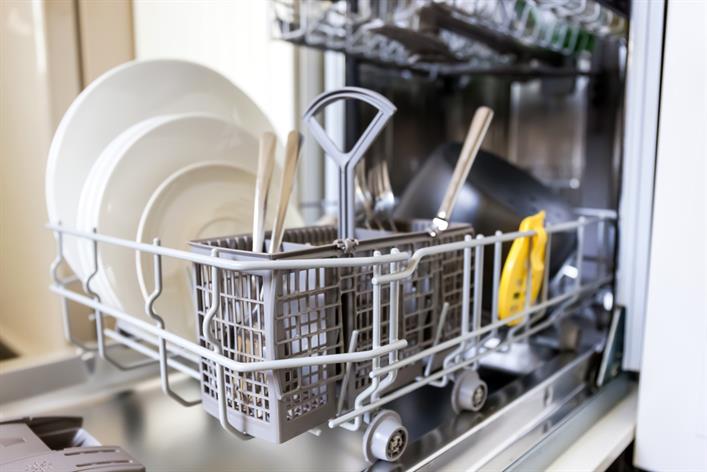
Your Key to Avoiding Plumbing , Drain and Dishwasher Disasters!
Of all the great modern conveniences in our homes today, probably none makes life as easy or saves as much time and labor as the kitchen dishwasher. When your dishwasher is working fine, life can be pretty fine. But when your dishwasher goes on the fritz or loses its cleaning efficiency, your personal efficiency can take a major hit. Dishwasher repairs usually aren’t major projects or expenses, but even a few days without a dishwasher can turn into a major hassle and inconvenience. And who wants dishpan hands, anyway?
Fortunately, most dishwasher problems are completely avoidable with proper maintenance and usage. That’s why it is extremely important to keep your dishwasher in good running condition. With a little proper care and attention, you should be able to get years of worry-free performance, cleaning and energy-efficiency from your dishwasher. These simple dishwasher tips will show you how.
General Dishwasher Maintenance Tips
A dishwasher is generally a low maintenance appliance. Below are some basic tips for keeping your dishwasher running in tip-top shape. (Note: Before doing any work on your dishwasher, turn off the power at the circuit-breaker box.)
- Don’t Get Zapped. Dishwashers have built-in water heaters and motors which can consume a lot of electricity; couple that with all the water a dishwasher uses and you can see how improper wiring and connections can put you at risk for electrocution, fire or power outages. A ll dishwasher should always be plugged into a grounded outlet or wired direct. And your main socket must be rated adequately to handle the large load required by most dishwashers.
- Make Sure Your Dishwasher is Level. If your dishwasher isn’t level, it could leak. To check, open the door and place an air-bubble level along the edge inside. If the dishwasher isn’t level, raise or lower either side by adjusting its “feet” or add a wedge to balance correctly.
- Check Gaskets for Cracks and Deterioration. These are the rubber or plastic seals along the dishwasher door that provides a water-tight seal when you close. If you start noticing water around your dishwasher, it could be due to faulty gaskets. If the gasket is damaged, remove it by unscrewing it or prying it out with a screwdriver. You can get a replacement gasket at a hardware store or order one from the manufacturer. Before installing the new gasket, soak it in hot water to make it more flexible.
- Check Sprayer Arm for Clogs. Over time Food particles, mineral deposits and other debris can clog the holes in the sprayer arm. It is essential to clean these small holes from time to time to enable the dishwasher to work more efficiently. Remove the sprayer arm periodically and soak in warm vinegar for a few hours to loosen any obstruction. Then clean out each spray hole with an awl or a pipe cleaner.
- Check and Clean Screens and Filters. Your dishwasher should have a screen or filter located near the bottom of the dishwasher above the food drain to catch any large food or debris; they need to be cleaned regularly to avoid clogs (at least every other week). Your dishwasher owner’s manual should provide instructions for removing and cleaning the filter. If the filter has holes, it needs to be replace in order to prevent harm to other parts of the dishwasher. Also, inspect and clear out any food or debris that might be trapped in the food drain.
- Invest in a Repair Kit. Notice any exposed metal, nicks or corrosion on your dish racks? These can cause rust and stains to dishes and dishwasher walls. Most hardward stores sell repair kits that allow you to quickly mend worn or chipped plastic.
Energy Efficiency Tips for Your Dishwasher
We measure the energy efficiency of our car in miles-per-gallon. Dishwasher efficiency is measured by a term called the energy factor. Energy factor is based on the number of cycles per kilowatt-hour of electricity. Today, the minimum allowable energy factor rating for standard capacity dishwashers is 0.46. The higher the number, the more efficiently your dishwasher is using energy. These tips can help you improve your dishwasher’s energy factor and get good cleaning results:
- Watch Your Water Temperature. The single most important factor in getting good results is hot water. The best way to improve the energy efficiency of a dishwasher is to reduce the amount of hot water needed to clean your dishes. About 80% of the total energy used by dishwashers goes towards heating the water. Too cool won’t clean your dishes well; too hot wastes energy. Most dishwasher manufacturers and detergent companies recommend setting the water temperature at 130 degrees fahrenheit; this will effectively remove all food particles and residue without wasting energy. Place a thermometer inside the dishwasher to determine if the temperature is appropriate. If above or below 130 degrees, adjust your hot water heater.
- Run Hot Water in the Kitchen Sink. Do this for a minute before you turn on the dishwasher. This will get hot water flowing through your pipes and start the wash cycle off with hot water rather than cold.
- Avoid Using the Delay Cycle. This, too, fills the dishwasher tub with cold water for the first few cycles, meaning the dishwasher will have to work harder to warm the water up.
- Avoid Using the Heated Dry Setting. Dishes can air dry without the use of heated air. This can produce substantial energy savings.
- Run Full Loads Only. Running only a portion of a load will use the same amount of energy and water as a full dishwasher load. Don’t be wasteful.
- Avoid Pre-Rinsing of Dishes. Scraping off leftover food is sufficient; a good dishwasher should be able to loosen and remove most food particles, even sticky ones. Soaking or pre-washing of dishes usually only necessary when something is burned or baked on.
Keeping Your Dishwasher Clean
The exterior of the dishwasher can be cleaned using a damp sponge and little detergent. Use any soft brush to clean the gaskets around the door and frame of the dishwasher; food debris can stick there and weaken the seal, allowing water to drip out while the machine is running. Look for any cracks or gaps in the seal. If there’s any damage, the gasket might need to be replaced.
The interior of the dishwasher does not need to be cleaned if it is being used regularly. If the dishwasher goes unused for a week or more, stains, mold and odor may form. Dishwasher cleaner and deodorizer can be used for this purpose. If you see many stains, clean with dishwasher detergent and water. Wear rubber gloves to protect the hand from alkaline detergents. You can also clean and disinfect your interior by running a cup or two of vinegar through the entire cycle of the empty dishwasher.
For rust removal on the inside of your dishwasher, try using a fine steel wool or a rust remover product.
Keeping Your Dishwasher Odor-Free
When properly installed and regularly used, dishwashers rarely develop problems with bad odors. Most dishwasher odor is related to food which has collected somewhere in the dishwasher and can’t be easily removed. Your first line of dishwasher odor defense is to always be sure to remove large food particles, non-dissolving and sticky food substances from all dishes before you put them in the dishwasher. Also, visually inspect every nook, cranny and corner of the dishwasher to see if any hidden food has wedged somewhere out of view. Other dishwasher odor tips:
- Suspect a Drain Clog. A foul-smelling dishwasher could be the first sign of a clog somewhere in your kitchen drain. If waste water accumulates at the bottom of the dishwasher and drains slowly…or if your garbage disposal and kitchen sink tend to back up when the dishwasher drains — this could be further evidence of a clogged drain. If so, clear the drain as soon as possible.
- Check Your Water Softener. If not properly balanced or maintained, water softeners can cause foul odors in the water supply.
- Disinfect and Deodorize. Run a cycle with a quart of vinegar to safely clean the tub and pump. Also, put a scoop of Tang powdered drink mix in your dishwasher to gently scour the interior walls and add a clean, fresh scent.
Dishwasher Detergents
What you put into your dishwasher significantly affects your dishwasher’s performance.
- Use Detergents Specifically Designed for Dishwashers. Hand washing dish detergents and other soaps must NEVER be used in dishwater. They are not formulated to clean dishes in a dishwasher. And they will produce large amounts of foam, suds and bubbles which will leak from the dishwasher and spill onto the floor. use detergents that are specifically meant for DISHWASHING ONLY.
- Choose Powders Over Gels. Powder detergents are usually a better choice than gels. Gels often contain chlorine bleach which car dissolve seals and gaskets. Gels don’t work well in hard water. Gels can clog the detergent dispenser which can impede cleaning performance. And gels tend to leave more spots, film and cloudiness on glassware. For best results, we recommend using a powdered detergent or tablets.
- Don’t Buy Dishwashing Powder in the Super-Size Box. It may seem cost-effective to purchase large economy-size boxes of dish detergent powder, but these products actually have a limited shelf life. Once you open that box, you only have about two weeks to use it; once air hits the powder, its cleaning effectiveness is greatly reduced. Stick to regular-size boxes which can be consumed in a two-week time period.
- Avoid Cheap Products. Make sure that the word DETERGENT appears on the box. Some inexpensive and non-name powders contain contain inferior cleansers; some even contain sand! These products should be avoided to prevent wear and damage to dishes and the dishwasher itself as well as sediment build-up.
Dishwashers and Glassware
Over time, spots, streaks and hazinesss can form on glassware when washed in a dishwasher, especially if you use hard water. Most manufacturers recommend that you hand wash most glassware, especially if it is finer glassware. If you do put glassware in your dishwasher, here are some things to keep in mind.
- If you have well water or hard water, use a rinse-aid — such as Jet-Dry — in your dishwasher. These will prevent much of the spotting and streaking on glassware caused by insoluble deposits that dry on glass surfaces. Most manufacturers recommend that you use a solid rinse aid rather than a liquid. Solid rinse-aids disperse more evenly and consistently and are simpler to use; you just need to hang them from your dishwasher’s upper rack.
- If you have a water softener, you may want to try cutting back on the amount of detergent you are using…or add a ¼ cup of vinegar to in the dishwasher before each load.
- No matter what type of water you have, be sure to run the dishwasher with a quart of vinegar and no dishes or detergent. This will removes any mineral deposits and residues left behind anywhere in the tub as well as disinfect and deodorize.
Common Dishwasher Complaints
Here are some quick troubleshooting techniques for some common dishwasher headaches:
My Dishwasher Won’t Drain.
If your dishwasher won’t drain, try cleaning the filter at the bottom of the dishwasher and then run the dishwasheer again. If this doesn’t work call a plumber or dishwasher repair specialist.
My Dishwasher Won’t Fill.
This could be due to several causes. Be sure the door is latched securely and that the water is turned on. Check that the dial pad is properly selected for the cycle and that the cycle has started. Check your home’s circuit breaker or fuse box. Check inlet hose for kinks or sediment; clean if necessary.
My Dishwasher Won’t Drain Water in the Bottom of the Tub.
Check your home’s fuse box for any blown fuses or circuits. Check that the dishwashing cycle is actually completed. Check drain hose for a kink and be sure the drain hose is elevated in the drain or disposer. If hooked up to a garbage disposal, be sure the knockout is removed from the disposal inlet.
My Dishwasher’s Detergent Cup Is Not Empty.
Check to see if the dishwasher cycle has actually completed. Make sure the dispenser is not blocked; clear it if you can. Be sure to use fresh dishwasher detergent which has been stored in a cool, dry place.
My Dishwasher is Making Noise.
A variety of odd noises can be expected with normal dishwasher operation including the sound of a water valve hiss during filling, humming during draining, water circulating/swooshing…even ticking sounds (usually just the timer). Thumping and snapping sounds are usually the wash arm bumping an item that is extending beyond the racks or the detergent cup lid hitting the door liner when the dishwasher door is opened at the end of the cycle. Be concerned if the noise is something you haven’t heard before, is forceful or sounds like it may be breaking your dishes.
My Dishwasher Leaks.
Check to make sure that the dishwasher is level. Too many suds can cause the dishwasher to overflow; make sure you are using the right kind of detergent and in the proper quantity. Use less detergent in soft water than in hard water. Check seals along dishwasher door for cracks and damage. If leakage continues and is more than just a few droplets, call a plumber or experienced dishwasher technician.
My Dishes and Dishwasher Interior are Stained and Discolored.
Aluminum utensils and pans can leave marks when they rub against other items; leave a slight space between them. Iron in the water can leave a yellow, brown or orange film; you may need to install a rust filter. Some foods and sauces (eg. tomatoes) may stain dishes and interiors; try using a dishwasher detergent that contains citric acid. Also, check the dishwasher rack for nicks or scratches in the plastic finish; if you notice any areas of your diswasher rack or interior with exposed metal, repair them as soon as possible with a plastic coating material or a water-proof sealant. Use a rust remover or fine steel wool to gently scrub rust and stains from dishwasher tub and walls.
My Dishes Don’t Get Clean.
If your dishes don’t get squeaky clean on the first wash, there are quite a few things to consider:
- Is there enough water? Test this by starting a cycle and allowing the unit to fill. When it is washing, open the door and check the water level; it must reach the heating element for the pump to work well. If it doesn’t reach the heating element, you may need to replace the water valve. If the water does reach the heating element, you may have more serious problems; consult with a plumber or dishwasher technician.
- Is the water hot enough? The temperature of the water should be at least 130 degrees fahrenheit. Adjust your hot water heater accordingly
- Do you have a blockage? Check both spray arms for foood particles and debris.
- Are you overloading the dishwasher? Try less dishes or putting too many large items (such as pots and pans) on the bottom rack. You may be impeding water from reaching all of your items. Follow manufacturer’s instruction for loading dishes to allow for proper water circulation.
My Dishes Remain Wet After I Use the Dry Cycle.
Be sure the heated dry setting is selected. Use a rinse aid regularly to improve drying. (Many dishwasher models come equipped with an adjustable rinse aid cap; turn the cap towards the MORE setting.) Check water temperature; if water is too cold, it won’t evaporate. Make sure dishes are loaded properly to allow for proper evaporation and dripping/draining; place dishes so water won’t accumulate. Plastic and Teflon items have porous surfaces that retain water; towel drying may be necessary.
My Dishwasher is Filled With Suds.
If you accidentally use regular dishwashing liquid for sinks or other soap products in the dishwasher, you could end up with a dishwasher full of suds that are extremely difficult to remove. Follow these steps:
- Sprinkle table salt across the suds to disperse them.
- Add a large quantity of ice cubes into the dishwasher to lower the water temperature and reduce the sudsing.
- Soak up as much water and suds as you can with a dry towel. Run the dishwasher again in rinse mode and repeat the salt and ice again if necessary.
- As a last resort, add a cup of liquid fabric softener to break up the sudes. Let the dishwasher run for a few seconds, then select the drain cycle.
Got a Dishwasher Problem? Call the Plumbing and Drain Professionals at Horizon Services!
For Fast, Friendly Service – 24 Hours a Day/7 Days a Week:
- New Castle County, DE: 1-800-642-4419
- Kent County, DE: 1-800-642-4419
- Delaware County, PA: 1-800-642-4419
- Chester County, PA: 1-800-642-4419
- Montgomery County, PA: 1-800-642-4419
- Bucks County, PA: 1-800-642-4419
- Gloucester County, NJ: 1-800-642-4419
- Camden County, NJ: 1-800-642-4419
- Burlington County, NJ: 1-800-642-4419
- Cecil County, MD: 1-800-642-4419
- Click Here to Schedule A Plumbing or Drain Cleaning Appointment Online!


